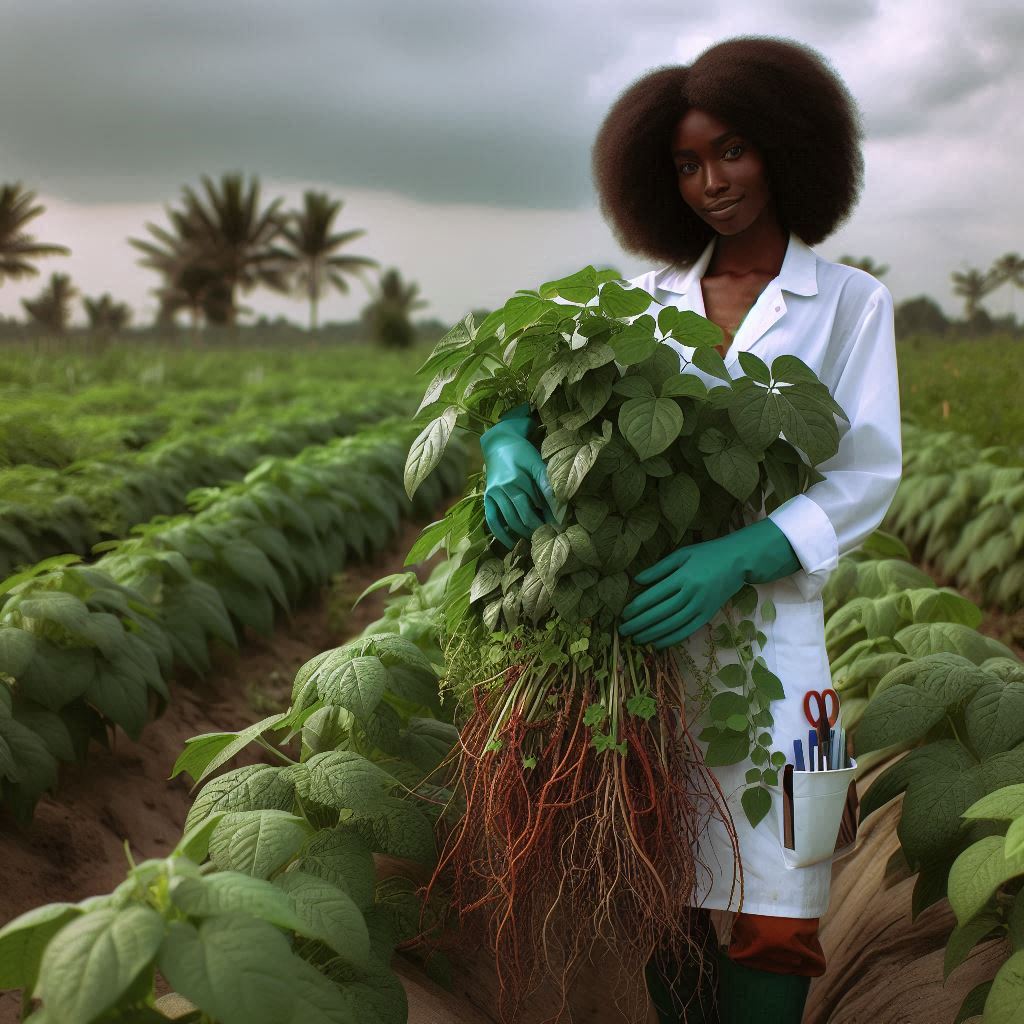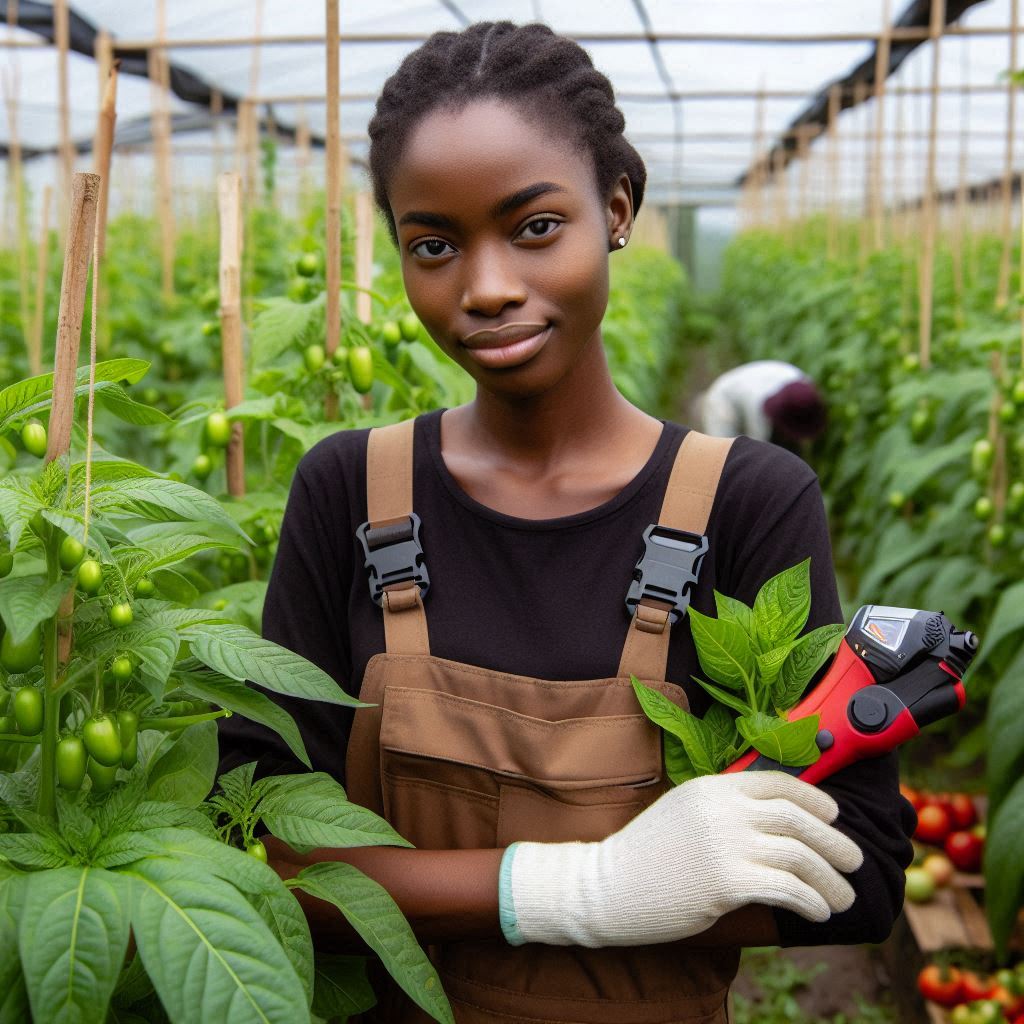Introduction
Understanding the fundamentals of seed science is vital for anyone considering a career in agriculture. Seed science encompasses the study of seeds, including their development, storage, germination, and quality assurance.
These aspects are crucial for ensuring successful crop production and improving agricultural practices.
In Nigeria, where agriculture is a key sector of the economy, the importance of seed science cannot be overstated.
As the population grows and demand for food increases, there is a pressing need for high-quality seeds to sustain agricultural productivity. This presents a growing opportunity for individuals interested in pursuing careers in seed science.
Moreover, with advancements in technology and research, the field of seed science is constantly evolving, offering new possibilities and challenges.
As such, there is a wide range of career paths available to those with expertise in seed science, including roles in seed production, research, quality control, and seed technology development.
In this blog post, we will explore the various educational pathways, skills, and opportunities available for individuals looking to start a career in seed science in Nigeria.
By understanding the significance of seed science and the potential it holds for agricultural advancement, aspiring professionals can embark on a rewarding journey towards contributing to food security and sustainable agriculture in Nigeria.
Research and Education in Seed Science
Importance of pursuing a degree in seed science or related fields
Embarking on a journey in seed science or related fields through academic pursuits is paramount. A degree in seed science or its related disciplines lays the groundwork for a fulfilling career in agriculture.
It equips individuals with the necessary knowledge and skills to understand the intricate mechanisms governing seed biology, genetics, and technology.
Overview of universities offering relevant courses in Nigeria
Numerous universities across Nigeria offer comprehensive courses tailored to meet the demands of the ever-evolving agricultural landscape.
Institutions such as Ahmadu Bello University, University of Ibadan, and Federal University of Agriculture, Abeokuta, stand at the forefront, providing undergraduate and postgraduate programs with specializations in seed science.
These programs are designed to encompass a wide array of subjects, including plant breeding, agronomy, genetics, and biotechnology, all essential components of seed science.
Available research opportunities in seed science
Research serves as a cornerstone in the field of seed science, offering aspiring professionals an avenue to delve deeper into its intricacies.
Within the academic realm, universities facilitate research endeavors focused on seed development, quality assessment, storage techniques, and technological advancements.
Additionally, research organizations and agricultural institutions provide platforms for students to engage in practical research projects, contributing to the broader understanding and innovation within seed science.
Moreover, collaborative initiatives between academia and industry further enhance research opportunities, allowing students to work on real-world challenges alongside industry experts.
These collaborations foster innovation, drive technological advancements, and address critical issues facing the agricultural sector.
By seizing these research opportunities, students not only gain invaluable hands-on experience but also contribute to the collective knowledge base of seed science in Nigeria.
Their findings have the potential to shape future agricultural practices, improve crop productivity, and ultimately contribute to the nation’s food security efforts.
In essence, the combination of academic education and research opportunities forms the bedrock for aspiring plant breeders and seed scientists in Nigeria.
Through dedicated learning and active engagement in research, individuals can pave the way for a rewarding and impactful career in seed science, addressing the pressing challenges and driving innovation within the agricultural sector.
Read: Horticulture and Food Security in Nigeria
Internship and Volunteer Experience
- Importance of gaining practical experience in seed science
- Tips on finding internship opportunities in seed science organizations
- Benefits of volunteering in seed science projects
Gaining practical experience through internships and volunteer work is crucial for anyone looking to start a career in seed science in Nigeria.
These experiences allow individuals to apply theoretical knowledge in real-world settings, develop essential skills, and build valuable connections within the industry.
Importance of Gaining Practical Experience in Seed Science
Internships provide hands-on experience in various aspects of seed science, including seed collection, storage, testing, and research.
This practical exposure helps individuals understand the complexities of the industry and gain valuable insights that cannot be gained through academic study alone.
By actively participating in seed science projects, interns can enhance their problem-solving abilities, analytical skills, and attention to detail.
They also have the opportunity to work with experienced professionals, learning best practices and industry standards that will benefit them in their future careers.
Tips on Finding Internship Opportunities in Seed Science Organizations
One of the best ways to find internship opportunities in seed science organizations is to network with professionals in the industry.
Attending conferences, seminars, and workshops related to seed science can help individuals connect with potential employers and learn about available internship positions.
It is also beneficial to regularly check job boards, company websites, and career fairs for internship openings in seed science.
Sending out targeted applications with tailored resumes and cover letters can help individuals stand out from other candidates and increase their chances of securing an internship in a reputable organization.
Benefits of Volunteering in Seed Science Projects
Volunteering in seed science projects not only allows individuals to contribute to important research and conservation efforts but also provides valuable experience that can enhance their resumes and skill set.
Volunteering demonstrates a commitment to the field and a willingness to learn and grow professionally.
Moreover, volunteering offers individuals the opportunity to work with experts in the field, gain firsthand knowledge of seed science practices, and build a strong professional network.
These connections can lead to future job opportunities and mentorship relationships that can further support career development in seed science.
Basically, internships and volunteer experiences play a vital role in preparing individuals for a successful career in seed science in Nigeria.
By actively seeking out opportunities to gain practical experience, individuals can develop the skills, knowledge, and connections necessary to thrive in the competitive field of seed science.
Read: Hydroponics in Nigerian Horticulture
Networking in the Seed Science Industry
Importance of networking with professionals in the field
Establishing connections within the seed science industry is indispensable for budding professionals. Networking opens doors to valuable opportunities, including mentorship, collaborative projects, and career growth.
By engaging with seasoned experts and peers, individuals can gain insights into industry trends, best practices, and emerging technologies.
Tips on attending conferences, workshops, and seminars related to seed science
Participating in seed science-focused events, such as conferences, workshops, and seminars, presents fertile ground for networking. During these gatherings, make the most of networking breaks and social events to interact with fellow attendees.
Approach conversations with curiosity, actively listen to others’ perspectives, and exchange contact information for future collaboration.
Furthermore, consider presenting your research or insights at these events to showcase your expertise and initiate conversations with industry professionals.
Additionally, volunteering or serving on organizing committees can provide invaluable exposure and networking opportunities within the seed science community.
How to connect with industry experts on social media platforms
In today’s digital age, social media platforms offer powerful tools for networking within the seed science industry. LinkedIn, in particular, serves as a professional networking hub where individuals can connect with experts, join industry-specific groups, and participate in discussions.
When reaching out to industry experts on social media, personalize your messages and highlight shared interests or mutual connections. Engage with their content by commenting thoughtfully and sharing relevant insights.
This demonstrates your genuine interest in the field and establishes rapport with potential mentors or collaborators.
Additionally, consider leveraging Twitter hashtags and participating in Twitter chats related to seed science to expand your network and engage with a broader community of professionals.
Remember to maintain professionalism and authenticity in your interactions on social media platforms.
Consistently sharing valuable content, such as industry news, research findings, or personal insights, can position you as a knowledgeable and engaged member of the seed science community.
Ultimately, networking is a cornerstone of success in the seed science industry.
By actively participating in conferences, workshops, and seminars, as well as leveraging social media platforms, aspiring professionals can forge meaningful connections, stay abreast of industry developments, and pave the way for a rewarding career in seed science.
Read: Overview of Horticulture in Nigeria
Professional Certifications and Trainings
Overview of relevant certifications in seed science
In the dynamic field of seed science, obtaining relevant certifications can significantly augment one’s professional profile.
Certifications such as Certified Seed Analyst (CSA) and Certified Seed Technologist (CST) are recognized globally and signify expertise in seed quality analysis, breeding techniques, and seed technology.
Moreover, organizations like the International Seed Testing Association (ISTA) offer comprehensive certification programs that cover a wide range of topics crucial for seed professionals.
These certifications validate one’s proficiency and adherence to international standards, enhancing credibility and opening doors to advanced career opportunities.
Importance of continuous learning and skill development in the field
The landscape of seed science is constantly evolving, driven by technological advancements and emerging challenges.
Continuous learning and skill development are imperative for professionals to stay abreast of the latest trends, methodologies, and regulations shaping the industry.
By engaging in ongoing education and training initiatives, individuals can deepen their understanding of seed biology, genetics, and technology.
They can also acquire proficiency in innovative techniques such as molecular breeding, marker-assisted selection, and seed biotechnology, enabling them to contribute meaningfully to research and development endeavors.
Furthermore, skill development fosters adaptability and resilience, equipping professionals with the tools to tackle complex problems and drive innovation in seed science.
Whether it’s mastering new laboratory techniques, refining data analysis skills, or honing communication and leadership abilities, continuous learning ensures that professionals remain at the forefront of the field.
Tips on choosing the right training programs for career advancement
Selecting the most suitable training programs is crucial for maximizing career advancement opportunities in seed science. To make informed decisions, aspiring professionals should consider several factors:
- Program Content: Assess the curriculum to ensure it covers relevant topics aligned with your career goals and interests. Look for programs that offer a comprehensive overview of seed science principles, techniques, and applications.
- Accreditation: Choose programs that are accredited by reputable institutions or professional organizations in the field of seed science. Accreditation ensures that the program meets established standards of quality and rigor.
- Faculty Expertise: Evaluate the credentials and expertise of the program’s faculty members. Seek out programs led by experienced professionals with a track record of research and industry engagement in seed science.
- Industry Relevance: Opt for training programs that are closely aligned with industry needs and trends. Programs that incorporate real-world case studies, practical exercises, and industry partnerships offer valuable insights into current practices and challenges.
- Hands-on Experience: Prioritize programs that provide opportunities for hands-on learning, laboratory work, and field experiences. Practical training enhances skill acquisition and allows participants to apply theoretical knowledge in real-world settings.
- Networking Opportunities: Consider programs that facilitate networking with peers, industry professionals, and experts in the field. Networking can lead to valuable connections, mentorship opportunities, and potential career advancements.
- Feedback and Reviews: Research feedback from past participants and alumni to gauge the effectiveness and reputation of the training program.
Reviews and testimonials can provide valuable insights into the program’s strengths, weaknesses, and overall impact on career development.
By carefully evaluating these factors, aspiring professionals can choose training programs that align with their career aspirations and contribute to their growth and success in the dynamic field of seed science.
Read: Field Work & Practical Training in Nigerian Forestry Schools

Job Opportunities in Seed Science
Overview of various job roles in seed science
Seed science offers a diverse array of career paths, including roles like seed technologist, seed analyst, and seed breeder. These positions involve tasks such as conducting seed quality assessments, developing new seed varieties, and implementing breeding programs.
Tips on navigating job boards and platforms for seed science roles in Nigeria
Utilize online job boards and platforms specific to the agricultural sector to search for seed science roles. Narrow down your search using keywords like “seed science,” “agricultural biotechnology,” or “plant breeding.”
Additionally, consider networking with professionals in the field and joining relevant industry groups on social media platforms. Networking can provide insights into job openings, referrals, and opportunities for career advancement.
Transform Your Career with Expert Guidance
Get personalized mentorship consulting that’s tailored to your unique path. Our expert advice is actionable and exclusive.
Get StartedHow to tailor your resume and cover letter for seed science positions
Customize your resume and cover letter to highlight relevant skills, experiences, and achievements related to seed science. Emphasize your expertise in seed quality analysis, breeding techniques, and laboratory protocols.
Include specific examples of projects or research initiatives you’ve undertaken in seed science, showcasing your ability to contribute to the field.
Tailor your application materials to align with the job description and requirements, demonstrating your suitability for the role.
Additionally, emphasize soft skills such as attention to detail, critical thinking, and problem-solving, which are essential for success in seed science roles. Use concise language and professional formatting to make your application stand out to potential employers.
By tailoring your resume and cover letter to showcase your qualifications and experiences in seed science, you can increase your chances of securing interviews and advancing your career in the field.
Building a Portfolio in Seed Science
- Importance of showcasing your work and projects in seed science
- Tips on creating a strong portfolio highlighting your skills and achievements
- How to leverage online platforms like LinkedIn and professional websites to showcase your portfolio
Building a portfolio in seed science is crucial for showcasing your expertise and experience in the field. It allows potential employers or collaborators to get a glimpse of your skills and accomplishments, which can help you stand out in a competitive job market.
Importance of Showcasing Your Work and Projects in Seed Science
Having a well-curated portfolio demonstrates your knowledge and proficiency in seed science. It provides concrete examples of your past work, research projects, and contributions to the field.
This not only validates your expertise but also serves as evidence of your capabilities to prospective employers or partners.
Moreover, a portfolio allows you to present your work in an organized and professional manner. It showcases your ability to communicate complex ideas, problem-solving skills, and creativity in addressing challenges related to seed science.
This can help you differentiate yourself from other candidates and leave a lasting impression on recruiters or collaborators.
Tips on Creating a Strong Portfolio Highlighting Your Skills and Achievements
When building your portfolio, consider including a variety of projects that showcase different aspects of your expertise in seed science. Highlight your accomplishments, such as research findings, publications, presentations, or collaborations with industry experts.
Make sure to provide clear descriptions of each project, emphasizing your role, contributions, and the impact of your work.
Include visuals, such as graphs, charts, or images, to illustrate your findings and make your portfolio visually appealing. Use a consistent and professional layout that is easy to navigate, with clear headings and sections for different projects or areas of specialization.
Don’t forget to update your portfolio regularly with new projects or achievements to reflect your ongoing growth and development in the field.
How to Leverage Online Platforms like LinkedIn and Professional Websites to Showcase Your Portfolio
In addition to creating a physical or digital portfolio, consider leveraging online platforms like LinkedIn to showcase your work and connect with other professionals in the seed science industry.
Create a detailed profile that highlights your experience, skills, and accomplishments in seed science, and upload projects or publications to demonstrate your expertise.
You can also use professional websites or platforms specific to seed science, such as research databases or industry forums, to share your portfolio and engage with a broader audience.
Networking with like-minded professionals, joining relevant groups or associations, and participating in online discussions can help you gain exposure and build your reputation in the field.
Remember to include links to your online portfolio in your resume, cover letter, or email signature to make it easily accessible to potential employers or collaborators.
By showcasing your work and projects in seed science through a strong portfolio, you can position yourself as a credible and competent professional, paving the way for a successful career in the field.
Conclusion
Embarking on a seed science career in Nigeria demands dedication, resilience, and strategic planning. Aspiring seed scientists should focus on key steps to ensure success.
Firstly, acquiring a solid educational foundation in relevant fields like agriculture, genetics, or biotechnology is crucial. This builds the necessary understanding and skills.
Secondly, seeking practical experiences through internships, research projects, and fieldwork enhances theoretical knowledge with hands-on expertise. These experiences develop problem-solving abilities and critical thinking skills.
Networking is also vital. Engaging with professionals, attending industry events, and using online platforms can open doors to career opportunities and mentorship.
Lastly, maintaining unwavering dedication and passion is essential. Despite inevitable challenges, aspiring seed scientists must stay committed to driving positive change and innovation in agriculture.
By embracing these principles, aspiring seed scientists can harness their potential and contribute to sustainable agricultural advancement in Nigeria. Continuous learning, collaboration, and excellence will ensure a promising future for seed science in the nation.




